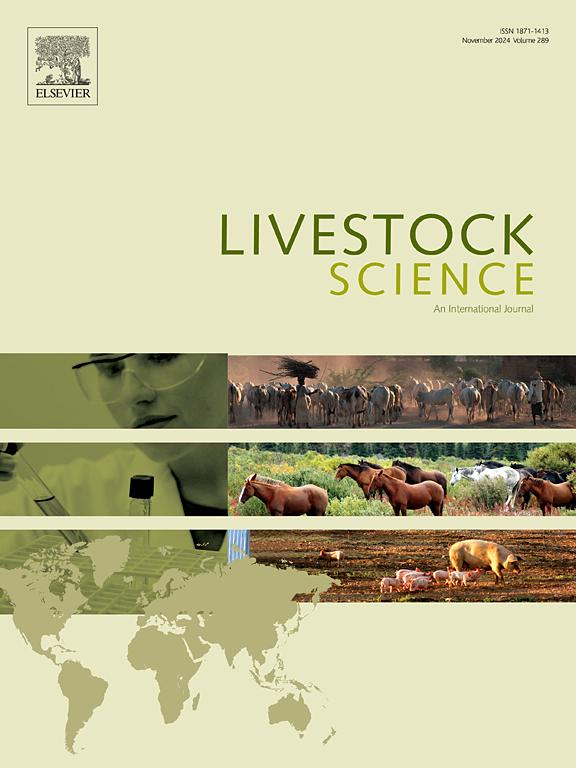Effect of black soldier fly (Hermetia illucens) larvae oil feed inclusion on growth performance and fecal microbiome development in post-weaning pigs
IF 1.9
3区 农林科学
Q2 AGRICULTURE, DAIRY & ANIMAL SCIENCE
引用次数: 0
Abstract
Post-weaning (PW) is a stressful period in the early life of growing pigs. Changes in diet may cause a shift in microbiome composition of the gastrointestinal tract (GIT), with potential effects on piglet health. Here, we evaluate the effect of black soldier fly larvae (BSFL) oil, as a sustainable nutrient source, on growth performance and fecal microbiome composition in PW pigs. Two trials were conducted, with Trial 1 including 60 piglets, of which 40 were sampled for microbiome analysis, and Trial 2 involving 160 piglets, of which 122 were sampled. All piglets were approximately 21 days old, Topigs/Pietrain crossbreed, weighed over 5 kg, and both trials lasted 39 days post-weaning. To assess the impact of BSFL oil blend on microbiome composition, 16S rRNA gene amplicon sequencing was performed on fecal samples collected on day 11 and 26 in Trial 1, and day 11 and 42 in Trial 2. No direct effects of BSFL oil blend implementation were observed on pig general performance in terms of body weight (BW), average daily gain (ADG) and gain-to-feed ratio (G). Moreover, no difference in microbiome development was observed with BSFL oil blend relative to soy and palm kernel oil. These results indicate that BSFL oil is a valid alternative nutrient source for weaned pigs, as both performance and microbiome are unaffected.
黑虻幼虫油饲料包埋对断奶后仔猪生长性能和粪便微生物群发育的影响
断奶后(PW)是生长猪生命早期的一个紧张时期。日粮的改变可能导致胃肠道微生物组组成的改变,对仔猪健康有潜在影响。本试验旨在研究黑虻幼虫油作为一种可持续营养源对PW猪生长性能和粪便微生物组成的影响。试验1为60头仔猪,其中40头进行微生物组分析;试验2为160头仔猪,其中122头进行微生物组分析。所有仔猪均约21日龄,为托猪/皮特雷恩杂交,体重均超过5公斤,断奶后均持续39天。为了评估BSFL油混合物对微生物组组成的影响,在试验1的第11天和第26天以及试验2的第11天和第42天收集的粪便样本进行16S rRNA基因扩增子测序。饲粮中添加BSFL油对猪的一般生产性能(体重、平均日增重和料重比)无直接影响。此外,与大豆油和棕榈仁油相比,BSFL混合油在微生物组发育方面没有差异。这些结果表明,BSFL油是一种有效的替代营养来源,因为它对断奶仔猪的生产性能和微生物群都没有影响。
本文章由计算机程序翻译,如有差异,请以英文原文为准。
求助全文
约1分钟内获得全文
求助全文
来源期刊

Livestock Science
农林科学-奶制品与动物科学
CiteScore
4.30
自引率
5.60%
发文量
237
审稿时长
3 months
期刊介绍:
Livestock Science promotes the sound development of the livestock sector by publishing original, peer-reviewed research and review articles covering all aspects of this broad field. The journal welcomes submissions on the avant-garde areas of animal genetics, breeding, growth, reproduction, nutrition, physiology, and behaviour in addition to genetic resources, welfare, ethics, health, management and production systems. The high-quality content of this journal reflects the truly international nature of this broad area of research.
 求助内容:
求助内容: 应助结果提醒方式:
应助结果提醒方式:


